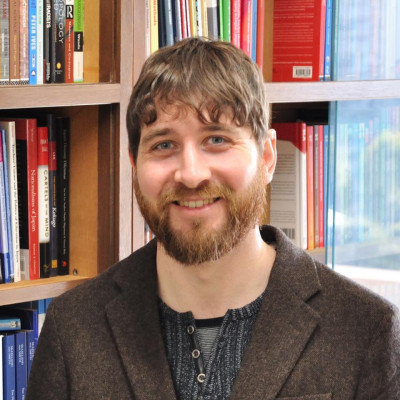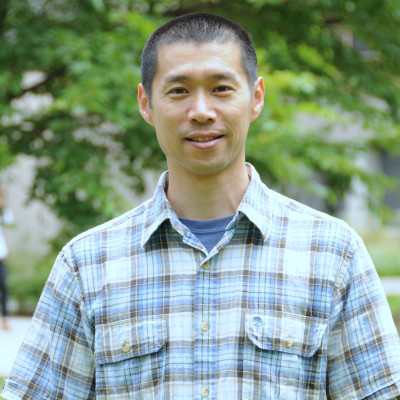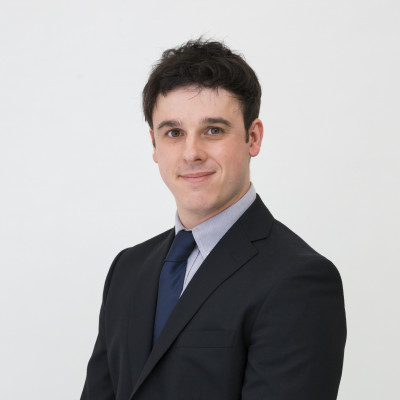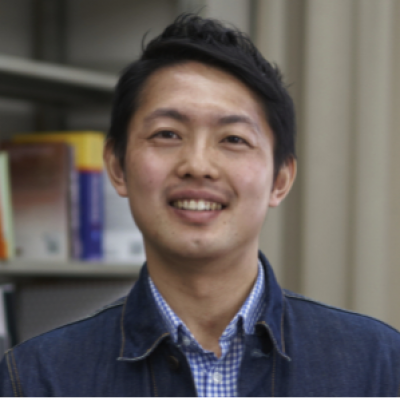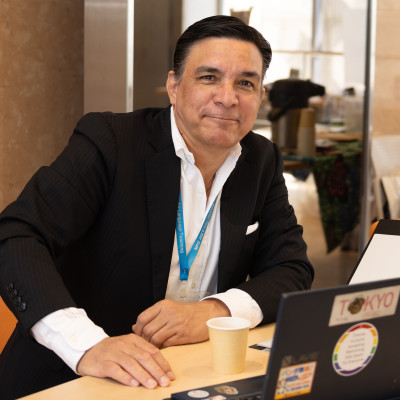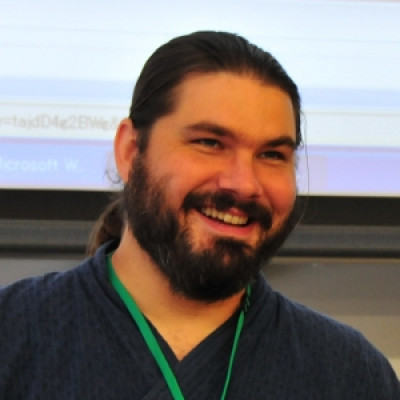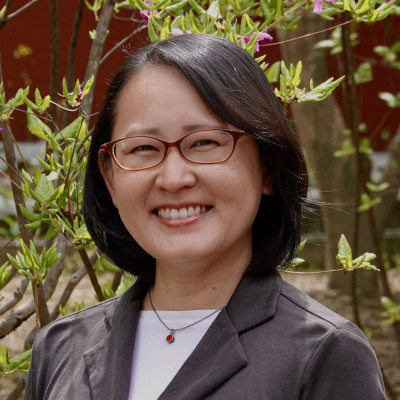Sessions / Location Name: E26
Physical Location
Location: E26
Building: Miwa Campus Building < The University of Nagano
Critical co-presenterships: Podcasting as reflective practice #2970
In 2014, the presenters began an independently-produced podcast featuring discussions about various aspects of language education. Although the initial goal of this project was to explore the format while talking about areas of mutual interest, an appreciation began to grow of how collaborative dialogue, in which interaction leads to a co-construction of new ideas and perspectives, can contribute to professional development. To capture this dynamic, the concept of the critical co-presentership was developed – a version of the well-established reflective practice of a critical friendship, but one that takes place within a recorded and publicly available format. This presentation reports on research conducted to explore the concept of the critical co-presentership through a process of duoethnographic reflection, in which two participants juxtapose their respective life histories in order to provide complex and nuanced perspectives on a particular phenomenon. This research led to a deeper conceptualisation of the critical co-presentership, which revealed broader implications for language teacher development. Results suggest that a discussion format that includes a time limit and awareness of a listening audience can assist the participants in defining concepts, connecting individual perspectives with universal themes, and engaging in critical discussion of classroom practice.
Using the J-POSTL Elementary: Benefits, Challenges and Possibilities #2860
A foreign language became a formal subject in Japanese elementary schools in 2020. Due to a lack of specialized English teachers, homeroom teachers are also teaching English classes on their own or in a team teaching combination. Thus, in order to prepare pre-service teachers (PSTs) for this eventuality, two new English courses have been added to the elementary education teacher license curriculum. The Japanese Portfolio for Student Teachers of Languages Elementary (J-POSTL Elementary) is a reflection tool featuring 167 self-assessment descriptors (SADs). Designed to be used by both pre-service and in-service teachers, it is currently being trialed at a number of universities. Qualitative survey data obtained after the completion of the two new English courses indicate that the PSTs found the J-POSTL Elementary useful for reflection, goal-setting and self-evaluation. However, some PSTs felt overwhelmed by the SADs, while others were unsure of how to use the portfolio effectively. This presentation highlights the benefits and challenges of integrating the J-POSTL Elementary into elementary education English classes. Possible future uses and adaptations of the portfolio and its components are also discussed, including English versions to create additional common ground between educators, and extending non-language specific SADs to general elementary education contexts.
Corrective Feedback: Investigating Japanese Learners' Perceptions #2863
Issues surrounding corrective feedback (CF) pose many questions for language teachers, including how often to give such feedback, how explicit to make it, and how closely student expectations in relation to CF align with what is pedagogically sound (Li, 2010). A small-scale study (N = 50) was conducted with the aim of gathering both quantitative and qualitative data on Japanese learners' views on CF to compare that data with what the literature has shown to be effective. The quantitative stage involved adult learners indicating their level of agreement with statements about CF on a five-point scale. In the qualitative stage, participants were first given a short English lesson, together with oral CF treatment according to the preferences they had expressed in the survey, before being interviewed on their views in more detail. Following a brief overview of CF literature, the rationale and study methodology will be explained with the data gathered compared to what previous studies have found. Finally, certain key issues raised in the qualitative section of the study will be discussed in greater detail, including issues conference participants may wish to reflect on in their own practice, as well as suggestions for possible future research in this area.
Modern Teacher Talk: Pedagogical Beliefs and Practices of Teachers in Japan #2812
For the past decade MEXT policies have increasingly promoted the teaching of English as a lingua franca (ELF), in which pragmatic skills are as valued as linguistic ones. This study investigated how teachers modify student-directed speech and whether they follow ELF principles of communicative accommodation and translingualism. Since modified speech is especially important for learners who lack exposure to comprehensible L2 input, by examining the teacher talk of experienced educators, best teaching practices can be established. The 19 junior high school teachers recorded dialogues in scripted, free structured, and free response scenarios. Their speech rate and lexical range was compared to 19 English speaking non-teachers to determine how teaching experience affects teacher talk. Though both teachers and non-teachers were willing to accommodate L2 users through speech modification strategies, teachers spoke at a significantly slower rate of speech and made lexical choices fine-tuned to the English proficiency of their learners. Interviews revealed the decisions teachers made to modify their speech were based on their teaching experience, pedagogical beliefs, and knowledge of their learners. The results suggest that the teachers made use of a wide variety of linguistic, semiotic, strategic, and material resources to facilitate communication in line with ELF principles.
Incorporating Online Practice Sessions in Pre-Service Training #2728
This Practice-Oriented Short Workshop will highlight the effect of incorporating online one-on-one tutoring sessions with JHS/SHS students for pre-service teachers to develop their teaching English in English. The Japanese Ministry of Education (MEXT) proposed teaching English in English both in JHSs and SHSs to advance students’ English communicative competence. However, preparing for this new policy is a challenge for pre-service teachers because, due to the COVID-19, practice opportunities to teach English have been limited. This workshop will explore how pre-service teachers conducted online one-on-one tutoring sessions about grammar and helped JHS and SHS students learn English through English. To improve JHS/SHS students’ English, prospective teachers used the first session to understand their tutee’s weakness in grammar. The pre-service teachers customized their lessons by creating original worksheets and materials to help their tutee overcome their shortcomings for the second session. Both pre-service teachers and secondary school students enjoyed the benefit of online sessions and showed the progress of their instruction and proficiency, respectively. The presenters will share the procedures and the effect of this collaborative project between the institution and the local school. Participants will leave with ideas for effective grammar instruction in English in regular lessons.
Factors affecting L2 motivation in a remote learning environment #2886
For learners to keep studying a second language such as English, a high level of motivation is important to maintain their enthusiasm and make progress in the subject (Cowie & Sakui, 2012). When COVID-19 hit the ELT industry, English language classes were conducted remotely. It brought pedagogical challenges and introduced a new environment for teachers and learners. This presentation highlights perceptions of both university teachers and learners on factors that support and hinder a university learner's L2 motivation in an emergency remote learning environment. A mixed methodology approach was carried out in a small scale study at a private university in Japan. Surveys were implemented with 11 teachers and 18 learners. Three participants from each data set were selected for interviews for further clarification. Survey findings showed similar perceptions from both data sets on supporting factors; with teacher behavior and approaches being a prevailing factor. Reported factors which were considered as hindrances to learning differed between data sets, with teachers perceiving a lack of a pleasant and supportive online atmosphere as a key hindrance to motivation. Learners reported a lack of a stimulating and enjoyable learning environment as the biggest hindrance.
Critical friendships: Bridging teaching beliefs and visible behaviors #2817
An often neglected aspect of reflective practice (RP) is the impact of teachers’ histories on the beliefs and principles that drive their classroom behaviors. Exploring the emergence of these “unseen” factors and their potential influence on professional practice, the presenters will illustrate how, through data-based and dialogic RP, they gained a deeper understanding of their own teaching whilst enhancing personal wellbeing and collegiality. This presentation is based on an RP study grounded in both conversational analysis of classroom data and a “critical friendship” in which the two researchers examined the gap between their stated teaching principles and their “visible behaviors” in a safe, non-judgemental environment. The presenters will share findings illustrating how historical experiences as both language learners and teachers had a profound impact on what they considered “good teaching.” Furthermore, they will discuss how dialogic approaches to RP can lead to increased professional confidence, open-mindedness, and humility. In line with assertions by Farrell (2019), the findings of this study suggest that rather than simply focusing on the visible elements of teaching (what we see in class), increased attention on the unseen factors driving teaching, such as historically-constructed beliefs, may lead to richer insights for practitioners and researchers alike.
Amplification through Simplification: Blackboard illustrations and their effect on vocabulary retention #2963
Humorous blackboard sketches were used to kindle interest among university students in subject matter, and an attempt at quantification of their effect was made in this study. Students attending similar lessons, differentiated by the use or non-use of illustrations, were afterwards surveyed to measure retention. Positive data results, foreshadowed by higher levels of engagement among students when sketches were used, suggest that students’ recall of key vocabulary was enhanced by using depictions which complemented a descriptive telling. Such drawings – little more than stick figures – may have moved students more quickly through the initial steps (observing, perception, and interpreting) of the cognitive learning process and into meaning construction. Amplification of a message through simplification agrees with Grice’s Cooperative Principle maxims in that such drawings be no more and no less informative than the explanation demands, they are relevant, and they avoid obscurity. An orderly and timely presentation of information demanded by Grice’s fourth maxim, done with care and in good taste, obviates the need for any artistic talent whatsoever on the part of the instructor. Furthermore, they contribute to an agreeable epistemic environment where students’ affective response is high, and pleasure, motivation, and low anxiety are the norm.
Conference proposal writing and reviewing: Constructive feedback #3099
Presenting ideas to fellow teachers and researchers is an essential part of professional development. Concisely describing a presentation in one or two hundred words of text is a challenge. Conference organisers must also put together teams of reviewers to assess the quality of each submission, and ideally write feedback that will be useful for authors to revise their submissions, whether to raise the standards of the current conference or to help authors when they apply to a later conference. This session is intended for anyone thinking about writing a presentation abstract, joining a reviewing team for a conference, or continuing to review and give feedback on submissions. This presentation will first consider the essential form and component of a presentation submission: who it relates to, what it is about, when and where it takes place, and why it is important. Then we will look at how reviewers can write feedback in a tone that is helpful without being patronising, and critical without being offensive. What are the rules concerning abstract writing and when do rules become guidelines? Do abstracts need references (Gough & Taylor, 2018)? Should abstracts include questions? (194 words including these ones!)
Expertise in L2 Teaching: Implications for Teachers, Administrators, and Researchers #2713
Teaching is a challenging profession. It requires juggling multiple roles in and out of the classroom while also being a mentor, an administrator, and a researcher. Therefore, as teachers gain experiences and establish routines, it is natural that some fall into a pattern of relying on the same teaching strategies and activities with little change. However, others continue to create new class activities or refine old ones as well as helping colleagues and contributing to improving programs. These teachers are often exceptional, and in many cases considered experts. Researchers have unveiled characteristics of expertise in teaching as well as its developmental processes (e.g., Asaba, 2019; Christiansen et al., 2018; Tsui, 2003). However, what these findings mean for educators have not been fully explored and discussed. The purpose of this presentation is to explore what previous studies of expertise in L2 teaching suggest for teaching and learning in L2 communities. The presenter first introduces previous literature and key concepts related to expertise in teaching, including teacher knowledge and a model of expertise known as progressive problem solving (Bereiter & Scardamalia, 1993). Then, the presenter will discuss implications that these studies have for teachers, administrators, and researchers in L2 teaching contexts.

